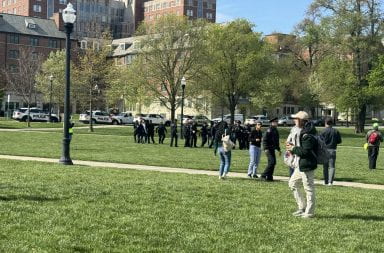As he spoke about the funeral of three small children in Northern Ireland that he covered in 1998, tears welled up in the eyes of the veteran The New York Times reporter.
“I cried all the way through writing it,” said Warren Hoge, the newspaper’s foreign affairs correspondent at the United Nations to an Ohio State journalism class Tuesday.
Hoge spent the day at OSU, talking to three classes and delivering a lecture at the Mershon Center for International Security Studies on “The United Nations in a Time of Change: A Conversation.” He discussed the relationship between the United Nations and the United States, the ongoing genocide in Darfur, and terrorism.
Throughout the day, his passion for journalism and the people he covered was apparent.
“You don’t see a lot of heart in the newspaper, he really connected with his stories on a passionate level,” said Laura Tompkins, an office associate at the Mershon Center.
Hoge has had many different jobs reporting and editing since graduating from Yale University with a Bachelor of Arts in English. He began his career in 1964 reporting in Washington for the Evening Star, and in 1966 he became the Washington correspondent for the New York Post until leaving to work for The New York Times in 1976.
Since starting at The New York Times as a metropolitan reporter, he has covered South and Central America as the newspaper’s Rio de Janeiro bureau chief, served as The New York Times London bureau chief, and is currently The Times foreign affairs correspondent at the United Nations.
“I came to hear him give this lecture because I am taking a class on United Nations security system and I wanted to hear what he (Hoge) had to say,” said Nick Reid, a senior in political science, “I am also interested in journalism and I wanted to hear what he gets to do, especially with the United Nations because I think its really important.”
Much of his lecture given Tuesday at the Mershon Center was about the inherent relationship between the United States and the United Nations.
“The subject of us and the United Nations, is, whether we want to believe it or not, the single most important relationship the United Nations has,” said Hoge. “The United Nations has never been as discredited as it has been in recent years … many American’s view the United Nations with mistrust, as a restraint of U.S. power.”
He stood by the United Nations even though some say it should be abolished. “Even in its mismanaged and flawed state, about which I have written, I think it, or something like it has to exist. In the globalized world of today the suggestions for an alternative just don’t work,” Hoge said.
He also discussed the United Nations as a peacekeeping organization.
“Kofi Annan, the former secretary general of the United Nations, always said that we have a responsibility to protect. What that means is: Here is the world, we are the United Nations saying that if you don’t protect your own people we, the outside world, will step in to save their lives; think Darfur,” he said.
Along with this, Hoge said peacekeeping is a way to deal with failed states, which he called breeding grounds for terrorism.
“I really enjoyed hearing him speak today, he had some really interesting things to say,” Reid said.
Throughout the day Hoge engaged students with stories of people he covered, such as an exclusive breakfast interview with the Prince of Whales; Richard, age 11; Mark, 10; and Jason Quinn, 9.
“The day I wrote the story about the children in Northern Ireland I felt real professional fulfillment,” he said. “I captured the poignancy of the moment.”
Kelly Cass can be reached at [email protected].


